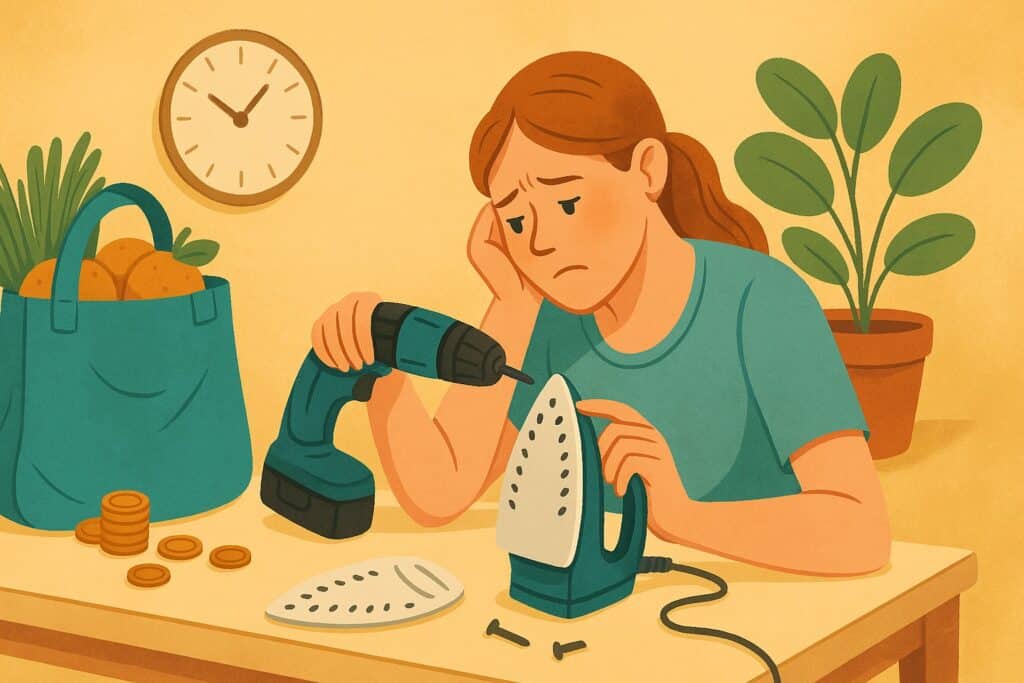How many times have you squeezed every last penny from your budget, only to end up feeling more anxious than accomplished?
I’ve been there too! Trying to be the “money-wise” version of myself, only to realise that what started as smart budgeting was slowly becoming a source of stress.
That’s where extreme frugality can quietly cross the line.
Sure, being frugal has its wins. Cutting costs, saving more, and feeling in control.
But when saving money begins to shrink your joy, disrupt your self-care, or affect your relationships, it’s time to ask: Am I doing too much?
Extreme frugality is often praised as the ultimate discipline, but it’s not without downsides.
If you’re skipping meals, avoiding social plans, or obsessing over every single purchase, your financial habits might be costing you more than just a few pounds.
They might be costing you peace of mind.
This post is not here to judge. It’s here to help. We’ll explore the warning signs of taking frugal living too far, and I’ll share a few extreme frugality tips that still prioritise your well-being.
Because saving money shouldn’t come at the price of your happiness.
Let’s unpack what balance really looks like and how to protect both your wallet and your well-being.
Why Extreme Frugality Appeals to Us
Have you ever found yourself bragging about how much you saved at the grocery store, only to pause and wonder why getting such a deal feels so good?
Extreme frugality tugs at us for different reasons. Sometimes, it’s the boost of pride that comes from outsmarting a big expense.
Other times, it’s about feeling more secure or in control, especially when money feels tight.
But like anything, chasing after savings can start to run our lives if we’re not careful.
Let’s look at why this urge can be so strong and where it can lead us if it goes too far.
The Thrill of the Challenge
There’s something exciting about turning saving money into a sport. Each coupon clipped or item reused can feel like a small victory.
For a lot of us, it’s about proving we can do more with less.
Imagine the satisfaction of finding a creative workaround or seeing your bank balance inch up with every skipped latte. That rush? It’s real.
Turning savings into a game can help us stay motivated, especially if we’re working toward big goals like paying off debt or building an emergency fund.
Many people on frugal living forums talk about how this mindset gave them a sense of purpose, reducing anxiety around the future,
If you’ve tried a spending freeze or a “no-buy” challenge, you know how it feels to compete against your own limits.
But sometimes, this chase for another “win” can go too far, feeding perfectionism or obsessiveness.
If celebration over saving turns into disappointment or shame whenever you do spend, that’s a red flag. Saving should feel empowering, not punishing.
When Saving Turns Into Deprivation
It starts small. Maybe you stop buying little luxuries, then skip dinners out with friends.
Next thing you know, you’re making big sacrifices, and it’s impacting more than your wallet. It’s hitting your happiness, your health, or even your friendships.
Lets look at some signs you’re moving from healthy frugality to true deprivation in the next section
Telltale Signs You’ve Gone Too Far With Frugality
Frugality can feel rewarding. Snagging a deal or skipping a fancy coffee can fuel that sense of control and accomplishment.
Extreme frugality can sneak in quietly, but the warning signs aren’t as hard to spot as you might think.
1. Sacrificing Self-Care and Health
Saving money should never mean putting your health on the back burner.
Skipping doctor’s visits, eating noodles for every meal, or ignoring chronic exhaustion may save a few bucks today, but the long-term costs aren’t worth it.
Some people avoid necessary appointments or stretch medications, hoping to save a little more.
In reality, illnesses left untreated can quickly get worse and cost much more to treat later on (The Dangers of Skipping Doses to Save Money).
Managing stress, getting good sleep, and eating nourishing food aren’t extras or luxuries.
They’re basic needs. Studies have shown that skipping medical care due to cost is sadly common, but it almost always backfires (“It Costs Too Much,” Americans Say About Skipping Necessary Medical Care: Survey Findings).
Here’s how I keep self-care and health at the top of my priority list, no matter the budget:
- Block off time for rest and recharge, just like you would for a bill.
- Meal plan with nutrition in mind. Simple, healthy meals can still be budget-friendly.
- Look for community clinics or sliding-scale providers to reduce out-of-pocket costs if insurance coverage is tough.
- Schedule check-ups and routine screenings before there’s an emergency.
I keep a running list of things I won’t compromise on, including nutritious food and preventive health.
If you need more inspiration or ongoing support for putting yourself first, check out these Mastering Self-Care Tips that can help you put wellness before worry.
2. Letting Relationships Suffer
I’ve watched friendships and even family ties fray because someone stuck too tightly to their “no spending” rules.
Maybe you’ve said no to a birthday dinner or skipped a group trip, even though the memories would’ve been priceless.
I once declined a friend’s potluck invitation because I didn’t want to chip in for ingredients.
Looking back, saving that twenty dollars wasn’t worth the awkwardness that lingered.
When frugality closes you off from connecting, celebrating, or showing up for people, it’s gone too far.
The small savings don’t compare to the warmth of shared laughter or feeling like part of a bigger circle.
If you find yourself:
- Skipping events you want to attend
- Feeling embarrassed about contributing less
- Having arguments about money with loved ones
…it may be time to loosen the grip a bit. Set aside a “connection fund.” Even five dollars a month can cover coffee with a friend, a greeting card, or something that keeps relationships alive.
3. Stressing Over Every Penny
Money should help you feel more secure, not spark endless guilt or stress.
If every expense, even basics like toothpaste or bus fare sets off a mental tug-of-war, it’s a warning sign.
That penny-pinching voice in your head can get so loud, it drowns out everything else.
Constantly monitoring every cent spent can turn into a cycle of anxiety, guilt, or even sleepless nights.
Emotional well-being takes a hit, and your mood can spiral (The link between money and mental health).
I’ve often heard from readers who feel like failures for simply buying something new or treating themselves, even on special occasions.
Here’s what helps me pull back when I get too focused on saving:
- Set “no-guilt” spending zones (like groceries or treats for special occasions)
- Practice gratitude for what spending allows, not just what saving achieves
- Remind myself that caring for my well-being is not selfish
If you catch yourself stressing over every choice, it might help to talk it out with someone you trust or journal about those worries.
4. Feeling Ashamed to Spend at All
Shame has no place in responsible money management.
Spending on things you need or even enjoy isn’t failure. If you feel selfish for replacing socks or buying a birthday gift, that’s a sign your frugal mindset has turned toxic.
Red Flags:
- Hiding receipts or purchases
- Feeling judged even by yourself for spending
- Feeling you “don’t deserve” anything nice
Frugal Fix: Journal through guilt. Practice self-talk like, “I deserve comfort and safety.” Spending wisely isn’t shameful. It’s human.
5. Hoarding, Over-Saving, or Stockpiling “Just in Case”
Fear-based frugality creates clutter, not peace.
When saving turns into hoarding free samples, expired food, or broken items, it creates more stress than safety.
Red Flags:
- Piling up “just in case” items you’ll never use
- Buying bulk without need
- Feeling anxious about throwing anything away
Frugal Fix: Declutter every season. Replace fear with trust—you’ll figure it out when the need comes. Quality over quantity always wins.
6. Refusing to Invest in Your Growth
If you’re not spending on your future, you’re stalling.
Avoiding courses, childcare, or better tools that could make life easier or earn you more is short-sighted.
Red Flags:
- Skipping classes, coaching, or skill-building
- Turning down time-saving tools or tech upgrades
- Viewing any form of personal development as a “waste”
Frugal Fix: Shift from cost to value. Will this help you grow, earn, or thrive? If yes, it’s not a cost—it’s an investment.
7. Avoiding Joy or Celebration
Life isn’t meant to be a joyless grind.
If every holiday, birthday, or special moment is skipped in the name of saving, you risk emotional numbness.
Red Flags:
- Never celebrating milestones
- Believing joy is “wasteful”
- Feeling guilty after any small treat
Frugal Fix: Celebrate simply. Homemade meals, handwritten notes, or outdoor walks can mark a moment beautifully. Joy doesn’t require big budgets.
8. Ignoring Time and Energy Costs
Time is valuable too.
If you’re exhausting yourself to save tiny amounts, it’s time to rethink the cost.
Red Flags:
- Driving across town to save £1
- Spending 5 hours fixing something that costs £10
- Saying yes to every task to avoid paying for help
Frugal Fix: Respect your energy. Sometimes outsourcing or upgrading saves more than it costs.
9. Isolating Yourself from Everyday Life
Frugality should support your life, not shrink it.
Avoiding normal outings, hobbies, or social experiences due to spending anxiety is a red flag.
Red Flags:
- Rarely leaving home
- Rejecting outings without even checking prices
- Feeling detached from the world
Frugal Fix: Reintroduce low-cost pleasures. Go to free museums, nature walks, or library events. Life is meant to be lived, not paused.
10. Living in Constant Fear of Spending
A frugal life should bring relief, not dread.
If every spending decision feels like a disaster waiting to happen, you’re living in survival mode.
Red Flags:
- Panic when faced with unexpected costs
- Avoiding spending even when you have savings
- Feeling sick or anxious after making a purchase
Frugal Fix: Build an emergency fund, even small. Practice mindful spending. Reassure yourself that your finances are tools, not threats.
11. Refusing Help or Support
Independence is great but stubbornness isn’t strength.
Refusing help when you need it, even when it’s offered with love, isolates you unnecessarily.
Red Flags:
- Turning down financial support or advice
- Believing you’re weak if you need help
- Feeling undeserving of assistance
Frugal Fix: Allow support. Accepting help is wise, not weak. You’d do the same for others.
12. Feeling Competitive About Who Can Spend the Least
Frugality is not a sport.
If you’re silently judging others or trying to “win” at saving, it’s become ego-driven.
Red Flags:
- Feeling superior because you spent less
- Competing with friends or influencers
- Shaming others for their purchases
Frugal Fix: Focus on your own values. Let others walk their money path while you honour yours.
13. Reusing Unsafe or Unsanitary Items
Frugality should never risk your safety.
Using expired or broken items—just to avoid replacement—is not worth it.
Red Flags:
- Reusing worn-out hygiene or medical items
- Fixing unsafe appliances instead of replacing them
- Avoiding essential cleaning or safety supplies
Frugal Fix: Know when to toss and replace. Health risks aren’t worth the savings.
14. Never Upgrading or Replacing What’s Broken
Sometimes the “make do” mindset creates more inconvenience and cost.
Red Flags:
- Living without heat or working appliances
- Ignoring household repairs
- Using glitchy tech that drains your time
Frugal Fix: Plan upgrades. Schedule repairs before crisis hits. Think of time saved as money earned.
15. Always Choosing the Cheapest Option Even When It Costs More Later
Cheapest isn’t always best.
Buying low-quality items that constantly break isn’t frugal. It’s frustrating and wasteful.
Red Flags:
- Constantly replacing cheap shoes, tools, or clothes
- Avoiding warranties or services that protect your purchase
- Focusing only on the price tag
Frugal Fix: Invest in quality. Choose what lasts, not just what’s cheap.
16. Budgeting Away Every Spare Dollar With No Flexibility
Rigid budgets can suffocate your life.
If you have no wiggle room, you’re setting yourself up for burnout.
Red Flags:
- Feeling panicked over surprise expenses
- Guilt after any deviation from the budget
- No line item for fun, joy, or breathing room
Frugal Fix: Add a “life happens” fund. Build in joy and unpredictability. Flexibility is freedom.
17. Skipping Meals or Under-Eating to Save
You need fuel to function.
Cutting meals to save money causes fatigue, fogginess, and long-term health issues.
Red Flags:
- Skipping breakfast or lunch
- Constantly hungry but “pushing through”
- Relying on filler foods with little nutrition
Frugal Fix: Stock up on budget staples like lentils, oats, and frozen veggies. Eating well doesn’t need to be expensive, it just has to be intentional.
18. Losing Sleep Over Money
Money management should bring peace, not insomnia.
Red Flags:
- Lying awake thinking about bills
- Overanalyzing every past purchase
- Feeling anxious about an uncertain financial future
Frugal Fix: Set money boundaries. Journal before bed, limit financial talk at night, and have a weekly check-in—not a 24/7 obsession.
19. Saying No Automatically Without Thinking
“No” isn’t always the right answer.
If you automatically reject anything that costs money without evaluating its value, you might be limiting joy.
Red Flags:
- Dismissing opportunities out of habit
- Assuming everything is “too expensive” without checking
- Feeling fear rather than curiosity about spending options
Frugal Fix: Ask: “Will this improve my life?” Pause before saying no. Some investments are worth it.
20. Feeling Emotionally Exhausted by Money All the Time
If frugality feels like a full-time job, something’s off.
Red Flags:
- Constant money fatigue
- Dread around money discussions
- Feeling like all you do is save, stress, repeat
Frugal Fix: Take breaks. Set a day where you don’t talk or think about money. Reflect on what money allows, not just what it restricts.
Finding a Healthy Balance: Frugality Without Deprivation
Here’s how I find that middle ground without giving up what matters most.
1. Set Values-Based Financial Boundaries
Before I make another budget cut, I ask what I truly care about. For me, that means putting my health, relationships, and personal growth above all else.
When you budget this way, it’s less about what you’re “giving up” and more about what you’re protecting.
Not sure where to start? Here are a few guiding questions:
- What are my non-negotiables when it comes to health, family, or passions?
- What expenses actually bring me lasting happiness?
- Where can I trim without feeling deprived?
I also check in with my “why” on a regular basis. Values can shift, and so can your budget. The most important part? Be honest about what fills you up.
If you haven’t already, try weaving self-care directly into your money plan.
For simple, realistic ideas, check out my favorite self-care and budgeting tips. They help you set healthy boundaries that make self-care sustainable, not a guilty pleasure.
You can find more inspiration from content like practicing self-care on a budget, which shows that wellness doesn’t have to break the bank.
2. Practice Mindful Spending and Guilt-Free Rewards
Once your budget reflects what you value, every dollar gets a purpose. No more random penny-pinching.
I like to plan out my spending in categories that actually matter to me and allow a little “fun money” for things that bring joy, even if it’s just a fancy latte or movie night.
Mindful spending can be as simple as:
- Assigning every dollar before it’s spent (think “give every dollar a job”)
- Allowing guilt-free splurges on meaningful experiences, not just things
- Keeping a “wish list” of little treats to enjoy now and then, so spending them feels special, not reckless
A small treat, like a cozy brunch with a friend, can fill your tank in ways that endless saving can’t.
You’re building discipline, but you’re also celebrating progress and caring for yourself.
If you’re curious how financial wellness connects to self-love, you might like the advice in Financial Wellness Is Self-Care.
Saving and spending aren’t rivals. They work best together when your plan is built around your life, not the other way around.
3. Embrace Community and Shared Experiences
It’s easy to think that saving money means doing everything solo, but that’s a lonely road. I’ve found some of the best moments happen when I share simple joys with others.
Affordable group activities build memories and deepen bonds in ways solo saving never can.
A few of my favorite low-cost, high-value ideas:
- Potluck dinners where everyone brings a dish
- Game or movie nights at home
- Community fitness events or walking groups
- Craft swaps or book exchanges
These experiences often bring more happiness than expensive nights out. You’re not just saving; you’re investing in your well-being and your community.
Social ties don’t need a huge budget to thrive.
For more on how strong relationships and healthy boundaries go hand in hand, I recommend reading about setting healthy boundaries in relationships.
4. Shift Your Mindset From Scarcity to Purpose
Always focusing on what’s missing can make frugality feel like punishment. I like to flip that thinking.
Instead of always asking “What should I cut?”, I focus on “What do I want to build?”
Every budget tweak becomes about creating more time, freedom, or security—whatever truly matters to me.
It’s about progress, not perfection. When I stumble, I refocus on my goals instead of beating myself up.
Studies show that approaching money with a hopeful mindset actually improves your finances, because it keeps you motivated for the long haul.
5. Use Simple Tools to Track, Plan, and Celebrate
You don’t need fancy spreadsheets to see where your money goes.
A notebook, a calendar, or a basic budgeting app like Mint or YNAB works just fine.
The trick is to check in with your spending every few days. Think of it as a regular self-care habit.
- Expense trackers: Find patterns and see small wins add up.
- Goal charts: Make savings visual with charts or jars. Watching your progress is motivating.
- Reward system: Treat yourself (even in small ways) when you meet a savings goal, so your brain learns that frugality actually feels good.
Keeping things visual and tangible helps those good habits stick.
6. Build Support and Accountability
It’s hard to do this alone. Whenever I share my goals with a friend, or follow a supportive community, I notice I stick with them longer.
Find people who care about their goals, not just bragging about the best deals. Community doesn’t have to mean a big group. Sometimes, one trusted friend is enough.
Here’s what works for me:
- Sharing weekly “wins” (or tough moments) with a friend or online group.
- Swapping money-saving tips and recipes.
- Asking for support when money stress gets heavy.
If you want to explore the balance between frugality and emotional health, Pheel Pretty has a great piece on how to deal with obsessive thoughts that covers how to quiet that inner critic and prioritize what really matters.
7. Set Healthy Boundaries (and Stick to Them)
Boundaries are the fence that protect both your budget and your happiness. Defining what you will and will not cut sets you up for success.
For example, I’ve learned never to skimp on nutritious food or time with loved ones. Make your own “no-go” list and keep it visible.
A few healthy boundaries to try:
- Always budget for health and basic comfort.
- Say “yes” to affordable fun with friends (even if it means loosening up on other expenses).
- Plan ahead for “cheat days” where you buy a treat, so guilt doesn’t spoil the moment.
8. Ask Yourself the Right Questions
Self-checks keep saving habits in the healthy zone. When you’re facing a tough choice, try questions like:
- Does this cut bring me closer to my long-term goals?
- Will I regret missing out on this, either now or later?
- Is my health or happiness being sacrificed here?
These simple check-ins help you avoid penny-pinching yourself into a rut.
Final Thought: Saving Should Support Your Life – Not Steal It
Frugality is meant to free you, not confine you like extreme frugality does. It’s there to give you options, create stability, and help you live with less pressure, not more.
If you’ve read through these signs and felt a little exposed or overwhelmed, please know this: you’re not alone. I’ve felt the weight of financial fear. I’ve second-guessed spending on simple joys. I’ve skipped self-care in the name of “being responsible.”
But I’ve also learned that true financial wellness is about balance, not sacrifice.
Saving money should never come at the cost of your mental health, your physical well-being, or your sense of connection and purpose. If you’ve slipped into survival mode in the name of frugality, now’s your chance to shift gently back into a place of intention.
Ask yourself:
Is my budget supporting the life I want? Or is it slowly taking me away from it?
Because it’s not just about saving money, it’s about saving your peace, your energy, and your joy.
And if you’re ready to move from rigid frugality to purposeful, values-driven money habits, I’ve created something just for you:
Take the Money and Self-Care Quiz and discover your budgeting blind spots and your unique self-care style. It’s quick, free, and actually fun.
You don’t need to suffer to be smart with money.
You’re allowed to be financially wise and feel good doing it.
Here’s to a life that feels as rich as it is well-budgeted.
For more practical guidance and to keep building a healthy money-life balance, check out these tips for financial wellness habits and explore ways to find empowerment on a budget.
Love what you just read? Share it with someone who could use a little more self-care and breathing space in their life.
Feeling inspired to take charge of your finances? Pass it on. Share this with a friend who’s ready to ditch the money stress and start making empowered choices.
Feeling inspired and ready to shine brighter? Spread the confidence! Share this with someone who could use a gentle reminder of their worth and strength.
Pin it, text it, or drop it in a group chat. Every share helps us build a supportive, uplifting community of women stepping boldly into their best selves.
Subscribe, share, and let’s cultivate unstoppable self-esteem—together.







